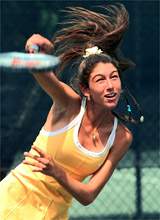 Gary I. Rothstein for The New York Times | |
| Monique Viele, center, with her father, Richard, and her mother, Bernadette, Tuesday. The family moved to Florida to help the daughter's tennis career. |
Now 14, she has become a disgruntled tennis prodigy whose equally disgruntled parents, Rick and Bernadette, have vowed to sue the WTA Tour if it persists in preventing their daughter from turning professional and hanging out her shingle, and her star, right now.

Gary I. Rothstein for The New York TimesMonique Viele, center, with her father, Richard, and her mother, Bernadette, Tuesday. The family moved to Florida to help the daughter's tennis career.
Instead of making a dream debut on Key Biscayne, Fla., this week at the Lipton Championships, Viele, who is shopping for a clothing contract, settled for an invitation to Nike's on-site clinics and corporate suite. "She feels extremely unfortunate that so many other girls before her were able to turn pro, make history, and maybe break records at 14, but she can't," said her mother.
Even though Viele (pronounced VEEL-ee) isn't yet the champion of anything more monumental than the 18's division of last summer's Florida Open, her final event before turning her back on picayune junior competition, hyperbole has already been heaped on her like so much glitter. According to the portfolio compiled by her parents and management team, she's a superstar who could be a supermodel, a 5-foot 9-inch, 125-pound prodigy for the millennium -- except that she and her parents don't want to wait for the century.
Viele's coach is Rick Macci, whose wife was the lawyer who composed the family's original letter of challenge to the WTA. Macci can't itemize Monique's talents without hyperventilating. He is a veteran tutor of adolescents earmarked as future superstars whose previous clients included Jennifer Capriati and Venus and Serena Williams. But Macci swears Viele is the best yet.
"She brings more to the table than just great tennis: she does it all, and she might be the most marketable American player in the last 25 years," said Macci. "She is the ultimate, total package, a one-in-a-million can't-miss prospect."

Gary I. Rothstein for The New York TimesMonique Viele working on her serve Tuesday at the Palm Air Country Club courts in Pompano Beach, Fla.
"It's a rule we absolutely will defend if we have to," McGuire said. "It's extraordinary how many parents there are who say the rule is great in concept, but that we ought to make an exception for their child."
But the Vieles aren't convinced that the rule is designed to protect their prodigy.
"The tragedy in all of this is that the best American to come along in a long time can't play," said Bernadette Viele, who with her husband publishes a stock market newsletter from their home in Coral Springs, Fla. "It's not like we want to go to the time and expense of filing a lawsuit, but if no concessions are made by the WTA by the U.S. Open, we will sue."
While the rule has weathered threats from Serena Williams and Anna Kournikova, both of whom made a restricted tour entry at 15, the only to player to sue was Croatia's Mirjana Lucic. Her unsuccessful challenge came last year in Sydney, Australia, where she tried to play doubles alongside Hingis.
The WTA says it consulted 91 experts, from physicians to trainers to prodigies past and present, in the formation of the extensive age eligibility legislation it adopted in 1995. The rule phases teen-agers into WTA competition gradually: it restricts 14-year-olds like Viele to four International Tennis Federation events and prohibits them from playing main Tour or Grand Slam tournaments. The Vieles, like most proud parents, believe their child is exempt from the pitfalls noted in a rule inextricably linked to Jennifer Capriati, a former prodigy who went from can't-miss kid at 14 to a troubled young woman three years later.
"We believe they came up with the rule because of Jennifer, but I don't think that what happened to Jennifer had anything to do with tennis," Bernadette Viele said. "It had to do with hanging around with the wrong kind of people. If money is the issue, we're willing to put whatever Monique wins in a trust until she's 18. It's not about the money for us, it's about competing with the best."
The Vieles embarked on their plan for Monique when Bernadette sent a videotape of Monique to the International Management Group when the prodigy was 9. That precipitated a visit to the I.M.G.-owned Bollettieri Sports Academy, where the renowned coach Nick Bollettieri offered her a full scholarship; with I.M.G.'s help, the Vieles transplanted themselves from Colorado to Florida when Monique, who was born in West Covina, Calif., was 10. Both Monique and her younger brother Gino are home schooled.
"Nick immediately said how great she was, that she was better than Kournikova and better than Seles, and that her most marketable attribute was her intelligence," said her mother. But the relationship between Bollettieri and the Vieles soured when the coach decided the parents were too demanding. "The baggage that came along with this girl was excessive," Bollettieri said. "We needed a van for it."
Something similar happened at Viele's next stop on the road to stardom, the Evert Tennis Academy in Boca Raton, Fla. Like Bollettieri, Chris Evert and her brother, John, were impressed by Viele's talent and work ethic. John Evert was almost too impressed.
"Her discipline and perseverance were admirable, but almost to the extent that I worried about her overtraining," he said. "Ultimately we had a difference in philosophy with them. What she wanted from the academy would have compromised the integrity of the program. They wanted her to have her own, private coach."
The Vieles then accepted Macci's invitation to train with him, and accepted his help in their challenge of the rule. Even though I.M.G. has encouraged McGuire to reconsider the restrictions on 14-year-olds, Stephanie Tolleson, a senior vice president at I.M.G., maintained that the company has no role in the Viele's prospective lawsuit.
"While we consider the eligibility rule a work in progress, if there's a lawsuit, they will be suing independently of us," she said.
Macci admits that the rule is only a temporary speed bump in Monique Viele's tennis trajectory. "Sure, when all is said and done, she's going to be a champion anyway," he said. "But it would be nice to get in there and spar with the best now if she's ready. If a kid shows genius-like capabilities at a young age, it should be a parental decision. The rule is wrong."
But the WTA and its experts think otherwise. "This rule goes way beyond protecting a player from the seduction of money and fame," said Jim Loehr, a sports psychologist and eligibility commission member. "We're also talking about preventing injuries. All the data shows us that the longer we kind of delay the stardom, the better the player's chances are of sustaining a successful career. Knowing what we know, it would be irresponsible to allow 14-year-olds to just have at it."